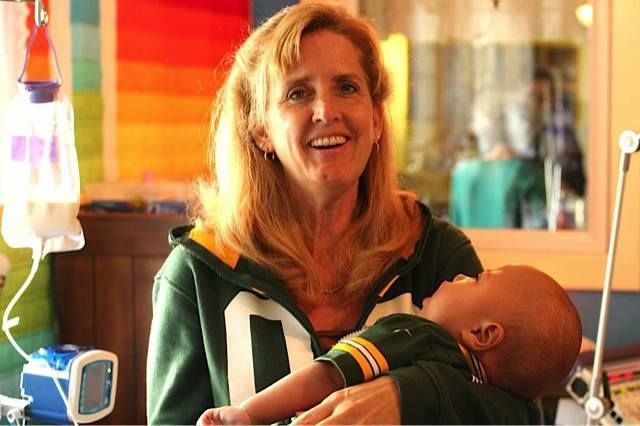Wisconsin Mom Cori Salchert Provides Foster Care For ‘Hospice Babies’ With Life-Limiting Or Terminal Illnesses

Cori Salchert has eight biological children with her husband Mark, but she’s been a mother to more babies than just her own. Her newly-adopted son, Charlie, relies on a ventilator, feeding tube, and other medical equipment to stay alive. The 1-year-old, despite the equipment and Cori’s care, isn’t expected to live.
“He will die; there’s no changing that,” Cori told the Sheboygan Press. “But, we can make a difference in how he lives, and the difference for Charlie is that he will be loved before he dies.”
The heartbreaking sentiment is not a new one for Cori, who worked as a registered nurse and perinatal bereavement specialist at the Hope After Loss Organization (HALO). The organization aims to help families cope with the loss of an unborn or newborn child. Cori sometimes found herself cradling children whose pulses were fading after their parents became too overwhelmed with emotion to hold them. Her work also exposed her to what she called “hospice babies,” children with limited or terminal diagnoses whose parents had given them up because of the situation. Cori explained that many of these babies spent their short lives being tube fed, and never removed from their cribs or held.
“There was no judgement on my part that the parents should just be able to deal with the circumstances,” Cori said. “But I thought, ‘wow, I would really like to take those kiddos and care for them.'”
Then, Cori was struck with serious medical problems of her own, battling an autoimmune disorder that led to gastrointestinal distress and multiple surgeries. There were complications, and Cori was left without a job, feeling hopeless. In August 2012, she and her family received a call asking if they would be willing to take care of a new "hospice baby, " a two-week-old girl with no name and no one to claim her.
The child had a grim prognosis — she had been born without the right or left hemispheres of her brain and had only a brain stem. This left her in a vegetative state, unable to see or hear. Cori brought the girl home anyways, named her Emmalyn, and accepted the “privilege” of giving the little girl a family.
Emmalyn lived only 50 days, but Cori said she lived more in 50 days than many folks do in a lifetime — she and her family brought Emmalyn everywhere with them, holding her and hugging her. When the evening came that the baby’s health started to fade, Cori made sure to keep her close, snuggling her into a warm bathrobe and singing to her until she passed.
“She didn’t suffer, she wasn’t in pain, and she most certainly wasn’t alone,” Cori told Today. “It was painful initially. Gradually we were able to see the opportunity to hold her through this life and as she entered the next solely as a gift. Emmalyn had left her tiny impression on our lives and, while we were grieving her loss, we eventually began to heal and consider taking in another baby.”
In October 2014, Charlie came home to the Salcherts with a life-limiting diagnosis of Hypoxic Ischemic Brain Encephalopathy, meaning he experiences neurological impairments because of a lack of oxygen to the brain. Charlie comes with a lot of equipment, and a lot of worry, but Cori plans to do her best.
“As in Emmalyn’s case, we do everything we can to love Charlie, and we take him on adventures with us everywhere we can,” she said. “We even got approval for a bed large enough for us to snuggle in with him and cuddle him while he is attached to the tubes and machines that keep him alive.”
Cori maintains that it is a gift to be a part of these children’s lives, and be able to ease their suffering even when they aren’t able to give back or even smile.
“We invest deeply, and we ache terribly when these kids die, but our hearts are like stained glass windows,” she said. “Those windows are made of broken glass which has been forged back together, and those windows are even stronger and more beautiful for having been broken.”
Published by Medicaldaily.com



























